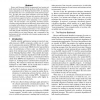Free Online Productivity Tools
i2Speak
i2Symbol
i2OCR
iTex2Img
iWeb2Print
iWeb2Shot
i2Type
iPdf2Split
iPdf2Merge
i2Bopomofo
i2Arabic
i2Style
i2Image
i2PDF
iLatex2Rtf
Sci2ools
IPPS
1996
IEEE
1996
IEEE
Software Techniques for Improving MPP Bulk-Transfer Performance
Brewer and Kuszmaul [BK94] demonstrated how barriers and traffic interleaving can alleviate the problem of bulk-transfer performance degradation on the Thinking Machines CM-5, by exploiting the observation that 1-on-1 communication avoids network congestion. We apply and extend these techniques on the Intel Paragon and MIT Alewife machines. Because these machines lack the CM5's fast hardware support for barriers, we introduce a token-passing scheme that avoids barriers while maintaining 1-on-1 communication. We also introduce a new algorithm, distributed dynamic scheduling, that brings Brewer and Kuszmaul's observations to bear on irregular traffic patterns by massaging traffic into a sequence of near-permutations at runtime, without requiring any preprocessing or global state. The measured performance of our algorithm exceeds that of traffic interleaving (the most effective technique proposed in [BK94]) on all three platforms, and is comparable to the performance of static ...
Avoids Network Congestion | Bulk-transfer Performance Degradation | Distributed And Parallel Computing | IPPS 1996 | Traffic Interleaving |
Related Content
| Added | 07 Aug 2010 |
| Updated | 07 Aug 2010 |
| Type | Conference |
| Year | 1996 |
| Where | IPPS |
| Authors | Eric A. Brewer, Paul Gauthier, Armando Fox, Angela Schuett |
Comments (0)

